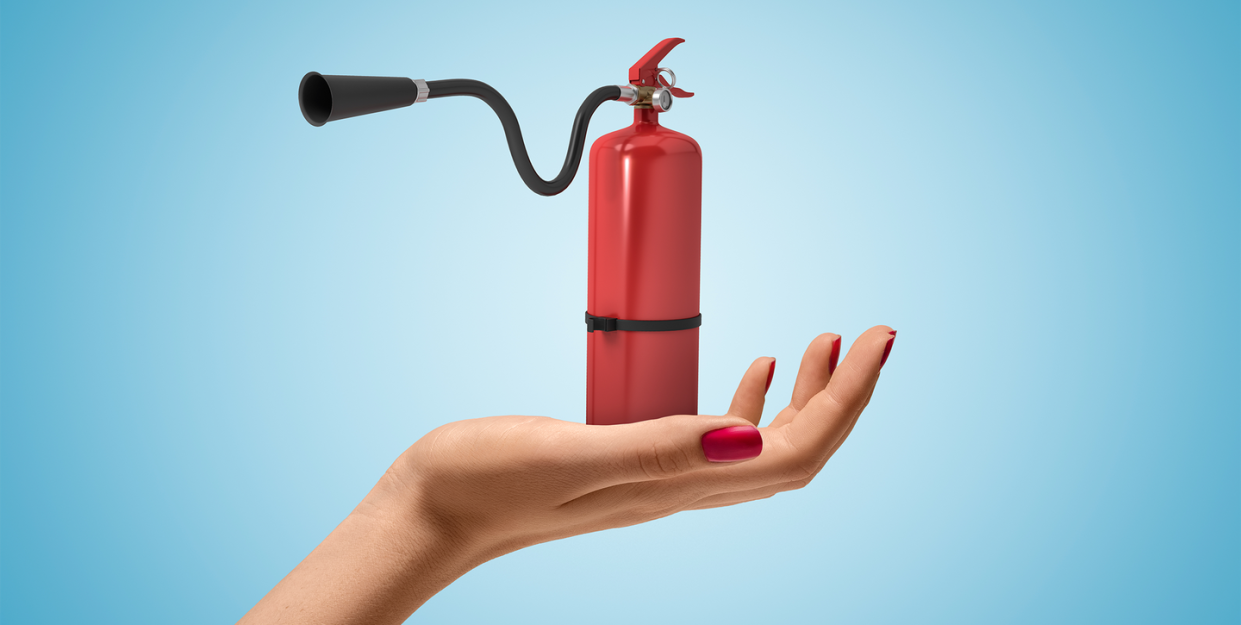Hot Flashes? Consider Talk Therapy to Ease Uncomfortable Menopause Symptoms

“Hearst Magazines and Verizon Media may earn commission or revenue on some items through the links below.”
When a hot flash strikes, it can throw off your whole day. But for women who can’t—or prefer not to—use medication, cognitive behavioral therapy (CBT) may help, says Sheryl Green, Ph.D., an associate professor at McMaster University, a clinical health psychologist at St. Joseph’s Healthcare Hamilton, and the author of The Cognitive Behavioral Therapy Workbook for Menopause. She uses CBT to help women with a variety of menopausal symptoms—here’s what she says women should know about it.
First, what is CBT?
It’s an evidence-based psychological and behavioral treatment that involves talk therapy. During CBT, a trained mental health care provider helps a patient identify inaccurate beliefs or negative ways of thinking about a situation and provides skills and tools to replace those beliefs with more accurate and balanced ways of thinking. Behavioral strategies are taught as well so people learn to respond to situations in a more helpful way.
OK, how can CBT improve hot flashes?
Hot flashes are spontaneous episodes of warmth or sweating that are usually felt on the chest, neck, and face. The main theory is that hormone fluctuations impact a woman’s thermoregulatory system in the brain. CBT does not prevent those physiological changes, but it offers effective ways to calm the stress response (which can exacerbate hot flashes) and cope with physical symptoms. Targeted CBT can address other menopausal symptoms as well.
So how does it work in everyday life?
Thoughts can powerfully influence how we feel and what we do. For instance, a woman in a work meeting having a hot flash may think, Everyone can see me sweat and must think there’s something wrong with me. If I talk now, I’m just going to mess up and look incompetent! Those thoughts not only are inaccurate, but also may cause her to leave the meeting—a problematic way of coping. Reframing the experience could sound something like, This is not a great time for a hot flash, but I know how to cope. I will remove a layer, drink water, and engage in paced breathing to cool down. It will pass within a couple of minutes. This response is more accurate and likely to reduce the distress, interference, and duration of the hot flash.
How long does it take for CBT to work?
It depends on the severity and the number of symptoms being targeted. In a randomized controlled trial we did in 2019, after 12 weekly sessions there were significant improvements in hot flashes, depression, sleep difficulties, and sexual concerns. Someone with mild or fewer symptoms usually needs fewer sessions.
Are there other effective treatments for menopause symptoms?
Certainly. If you are open to medications, the gold standard is hormone therapy. Interestingly, some antidepressant medications have been shown to be effective at reducing hot flashes and are being prescribed even for those who are not experiencing depression. Mindfulness and breathing techniques have also been shown to help with hot flashes.
How can I find a provider?
Practitioners trained in CBT specifically for menopausal symptoms are rare, but a mental health care provider who is trained and experienced in CBT can tailor their work to address your needs. Try using this tool from Psychology Today, which allows you to find therapists who are experienced in certain modalities.
This article originally appeared in the July 2021 issue of Prevention.
You Might Also Like

